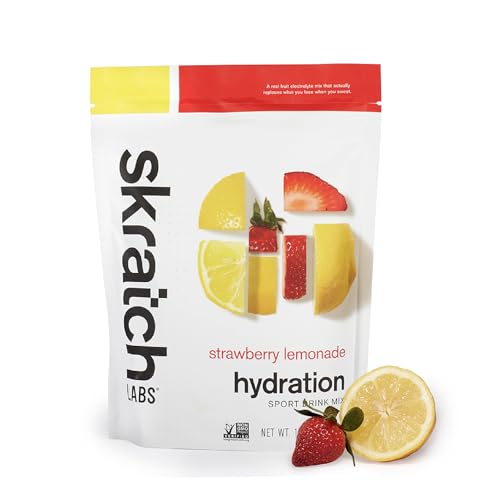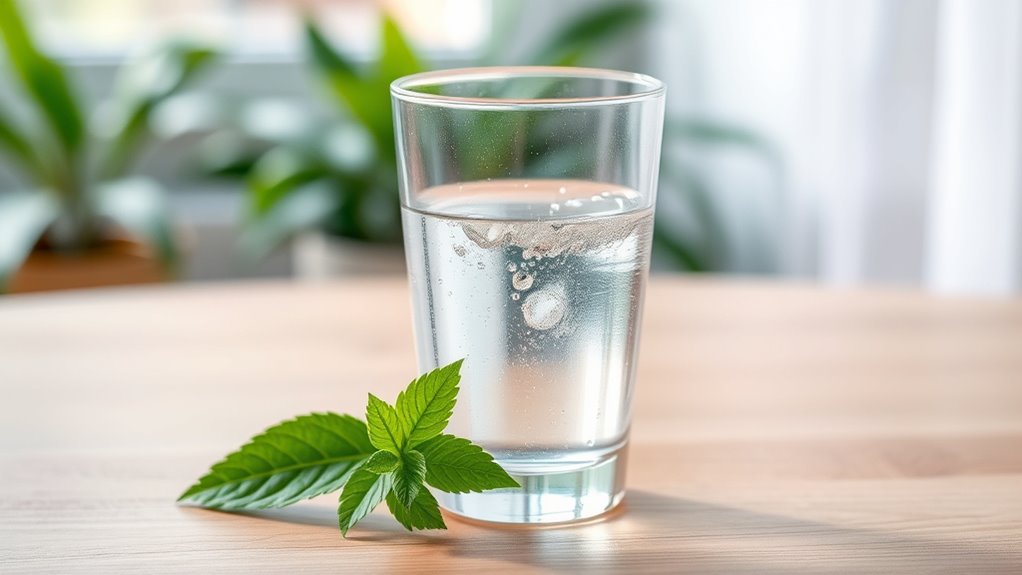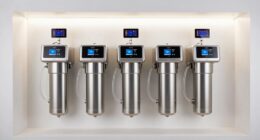Staying properly hydrated is key to keeping your electrolytes balanced, which supports muscle and nerve functions. When you drink enough water, your body can efficiently circulate blood, remove waste, and deliver nutrients. Hydration also helps prevent dehydration-related issues like fatigue, cramps, and dizziness, especially during physical activity or in hot weather. By maintaining good hydration habits, you can boost your overall health and well-being—if you want to discover more about how hydration works, keep exploring.
Key Takeaways
- Proper hydration maintains electrolyte balance, essential for muscle and nerve function.
- Drinking enough water supports circulation, waste removal, and nutrient delivery for overall health.
- Hydration improves physical performance, prevents cramps, fatigue, and heat-related illnesses.
- Adequate water intake aids digestion, skin health, and cognitive function.
- Consistent hydration helps prevent dehydration symptoms like dizziness, weakness, and muscle cramps.

Have you ever wondered how staying properly hydrated impacts your overall health? Maintaining good hydration isn’t just about quenching your thirst; it plays an essential role in various bodily functions. One of the key aspects of staying hydrated is keeping your electrolyte balance in check. Electrolytes—such as sodium, potassium, calcium, and magnesium—are minerals that carry an electric charge and are indispensable for muscle function, nerve signaling, and fluid regulation. When you don’t drink enough water, these electrolytes become imbalanced, leading to symptoms like muscle cramps, fatigue, dizziness, and even more severe health issues. Proper hydration helps your body maintain this delicate electrolyte balance, ensuring that your muscles and nerves work efficiently throughout the day.
Proper hydration maintains electrolyte balance, supporting muscle function, nerve signaling, and overall health.
When you think about hydration and exercise, the connection becomes even clearer. Physical activity increases your body’s need for fluids because you lose water through sweat. If you don’t replenish these fluids, dehydration sets in, which can impair your performance and recovery. Drinking enough water before, during, and after exercise helps sustain your energy levels and prevents cramps and heat exhaustion. For intense workouts, sports drinks that contain electrolytes can be beneficial, as they help replace the minerals lost through sweat, supporting ongoing hydration and muscle function. Failing to hydrate properly during exercise not only hampers your physical performance but can also prolong recovery time and increase the risk of injury.
Beyond exercise, hydration influences your body’s ability to detoxify and circulate nutrients. When you’re well-hydrated, your blood volume remains paramount, allowing your organs to efficiently filter waste and deliver oxygen and nutrients to tissues. This process keeps your immune system functioning properly and helps your skin stay healthy and resilient. Conversely, dehydration causes your blood to thicken, making it harder for your heart to pump blood effectively and increasing your risk of complications like blood clots or low blood pressure. Additionally, drinking adequate water can support cold-pressed vegetable juice consumption, which retains more nutrients and antioxidants, further promoting your health.
Furthermore, water acts as a natural appetite suppressant and aids digestion, preventing issues like constipation. Proper hydration also supports cognitive functions, keeping your mind alert and focused. It’s easy to overlook daily hydration needs, but consistently drinking enough water is essential for maintaining overall health. So, make it a point to pay attention to your hydration levels—your body depends on it. Whether you’re working out, managing daily tasks, or simply going about your day, staying properly hydrated helps ensure your body functions smoothly, keeping you energized, healthy, and ready to face whatever comes next.

Sahara Sailor Water Bottle 32oz, Durable and Leakproof Water Bottles Motivational with Time Marker, Tritan, BPA Free, Wide Mouth with Easy Clean Brush for Gym, Travel, Home, School, Office (1 Bottle)
Stay Hydrated Throughout the Day: staying hydrated is often easier said than done. With the Sahara Sailor clear…
As an affiliate, we earn on qualifying purchases.
As an affiliate, we earn on qualifying purchases.
Frequently Asked Questions
How Can I Tell if I’M Drinking Enough Water Daily?
You might wonder if you’re drinking enough water daily. To gauge this, pay attention to your hydration habits and signs like dry skin, fatigue, or dark urine. Don’t fall for hydration myths that suggest everyone needs the same amount; your needs depend on activity level and climate. Keep track of your water consumption habits, and if you’re urinating frequently clear, you’re likely well-hydrated.
What Are the Signs of Dehydration in Children?
Signs of dehydration in children include dry mouth, sunken eyes, and lack of tears when crying. You should watch for decreased urination, dark-colored urine, and irritability, as these hydration cues indicate pediatric hydration issues. Recognizing these signs is vital for children’s health, as dehydration can worsen quickly. Keep an eye on their behavior and physical state, and guarantee they stay well-hydrated to maintain peak hydration and overall well-being.
Does Drinking Water Help With Weight Loss?
Drinking water can support your weight loss efforts by helping with calorie reduction, as it often replaces sugary drinks. It also boosts your metabolism, making your body burn calories more effectively. Staying well-hydrated helps control hunger and prevents overeating. By drinking enough water, you encourage your body to function at its best, aiding your overall weight management goals and keeping you energized throughout the day.
Can Excessive Water Intake Be Harmful?
Like pouring too much water into a delicate glass, excessive intake can be harmful. You might experience water intoxication, which dilutes your electrolytes, leading to dangerous imbalances. This can cause symptoms like headache, nausea, or confusion. Overhydration disrupts your body’s natural balance, so listen to your thirst signals. Drinking water in moderation keeps you healthy and prevents electrolyte imbalance, ensuring your body functions smoothly.
Are There Specific Hydration Needs for Athletes?
As an athlete, your hydration needs are unique, requiring attention to electrolyte balance and hydration timing. You should drink fluids regularly before, during, and after exercise to maintain ideal performance. Incorporate electrolyte drinks if you’re sweating heavily, and don’t wait until you’re thirsty. Proper hydration helps prevent cramps, fatigue, and dehydration, ensuring your body functions at its best during intense activity. Adjust your intake based on your workout duration and intensity.

Skratch Labs Hydration Sports Drink Mix – Real‑Fruit Electrolyte Powder for Fast Hydration & Endurance | Strawberry Lemonade | 20 Servings | Vegan, Non‑GMO, Clean Ingredients
ELECTROLYTE REPLACEMENT – Replaces the electrolytes lost in sweat with a balanced profile of sodium, potassium, and glucose…
As an affiliate, we earn on qualifying purchases.
As an affiliate, we earn on qualifying purchases.
Conclusion
Staying hydrated isn’t just about quenching your thirst; it’s the foundation that keeps your body running smoothly, like oil in a well-oiled machine. When you drink enough water, you’re giving your body the fuel it needs to function at its best, boost your energy, and keep your mind sharp. So, make water your trusty sidekick—because when you prioritize hydration, you’re nurturing your health from the inside out. Cheers to a healthier, more vibrant you!

BOOST Smart Water Bottle with Reminder & Tracker, Double Wall Vacuum Insulated Bottles Stainless Steel, 32oz BPA-Free Wide Mouth for Gym, Office, School, Ideal Gift for Christmas, New Year
IDEAL FOR YOUR LOVERS: Given its combination of smart features, excellent insulation, and stylish design, the BOOST water…
As an affiliate, we earn on qualifying purchases.
As an affiliate, we earn on qualifying purchases.

AquaFrut 32 OZ Fruit Infuser Water Bottle BPA-Free Fruit Infusion Sports Bottle – Flip Top Lid w Drinking Spout, Leak Proof, Made of Durable Tritan. Free Recipe eBook! (Black)
FREE RECIPE eBOOK – AquaFrut premium infuser water bottle comes with a free starter guide and recipe eBook….
As an affiliate, we earn on qualifying purchases.
As an affiliate, we earn on qualifying purchases.










